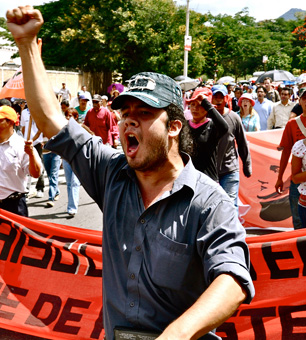In the two years since the ICC opened its preliminary investigation, Honduras has become the murder capital of the world and among the most dangerous countries in which to be a reporter. It is time for the Court to intervene.
It was killings like that of 19-year-old activist Isis Murillo at the hands of the Honduran military after the 2009 coup that first led the International Criminal Court (ICC) to investigate evidence of state-sponsored violence and repression in Honduras. It is now two years since the investigation was opened, and today, the Center for Constitutional Rights (CCR) submitted new documentation showing that the human rights violations continue along with the impunity for crimes like Murillo’s murder.
With hundreds of people, including journalists, trade unionists, land activists and human rights lawyers being killed or disappeared since the coup, and mounting calls for action from the Honduran people and international human rights groups, will the new ICC Chief Prosecutor, Fatou Bensouda, take action to help stem the tide of violence and prevent more lives being lost?
It was only a few days after the coup that ousted President Manuel Zelaya when thousands of Hondurans took to the streets to protest Murillo’s killing, the first of many casualties of the new regime, and demand a return to democracy. Three years later, it is hard to overestimate the gravity of the situation in Honduras or the courage of those who still dare to resist the status quo.
Honduran activists and human rights defenders are overwhelmed with the ever-mounting threats and violence and talk about feeling under siege and abandoned. Since taking on Murillo’s case, we at CCR hear constantly from partners and friends on the ground about the continued police and military involvement in targeted assassinations, arbitrary detentions, kidnappings, political persecution and violent crackdowns on peaceful protesters. Their plight is made all the more difficult by the false narrative repeatedly asserted by the United States, Honduras’ closest ally, that things are improving.
As many predicted, the new Lobo administration – “elected” in a process most international observers decried as illegitimate – has ensured that many of the same actors behind the coup remain in power and free of any form of accountability for their actions. Honduran coup leader and former de facto president Roberto Micheletti is now a “legislator for life.” Romeo Vasquez Velasquez, the head of the armed forces who carried out the coup, is now the head of the state-owned communications company Hondutel and has announced he’s running for President in 2013.
The Honduran judicial system actually stands in the way of accountability. As Human Rights Watch has reported, the Honduran Supreme Court, found by even the de facto government’s Truth and Reconciliation Commission (TRC) to have been complicit in the coup, has fired judges who publicly questioned the legality of the coup and created a climate among the judiciary in which lower court judges are discouraged from ruling against de facto authorities. As expected, the Supreme Court exonerated officials charged with carrying out the coup.
In these circumstances, efforts toward accountability in Honduras have become a death sentence. In September, Antonio Trejo and Manuel Diaz, two of the most-prominent human rights attorneys who dared challenge the de facto authorities, were assassinated within 72 hours of each other. As the United Nations High Commissioner for Human Rights Navi Pillay said after the killing, “the impunity that surrounds these violations is unacceptable. When the perpetrators know they are very likely to get off scot-free, there is nothing to deter them from killing off more of the country’s finest human rights defenders.”
In attempting to avoid a civil case in the United States, Roberto Micheletti unwittingly provided additional evidence that helps establish a necessary prerequisite for the ICC to take action – that the national system is unwilling or unable to genuinely investigate and prosecute the offenses. Among the documents we sent today to the ICC were the declarations of Honduran officials filed by Micheletti in our civil case against him on behalf of Murillo’s parents that unequivocally affirm he is not being investigated for Murillo’s killing. This is despite the fact that even the government’s own TRC concluded that Micheletti bore command responsibility for the teen’s death, as well as others.
Recently, Chief Prosecutor Bensouda stated, “My mandate is to investigate and prosecute those most responsible for the world’s gravest crimes, where no-one else is doing justice for the victims.”
The ongoing human rights crisis in Honduras is exactly what the ICC was created for. Victims of state violence have no place to turn for justice and accountability. For the Honduran people, the ICC is indeed a “court of last resort,” and the last hope to stem the tide of post-coup violence before more voices like Isis Murillo’s are silenced.
Matching Opportunity Extended: Please support Truthout today!
Our end-of-year fundraiser is over, but our donation matching opportunity has been extended! Today, all donations to Truthout will be matched dollar for dollar. Your one-time gift today will be matched immediately. As well, your monthly donation will be matched for the whole first year, doubling your impact.
This matching gift comes at a critical time. Trump has made it no secret that he is planning a demolition-style attack on both specific communities and democracy as a whole, beginning on his first day in office.
Help us prepare for Trump’s Day One, and have your donation matched today!
